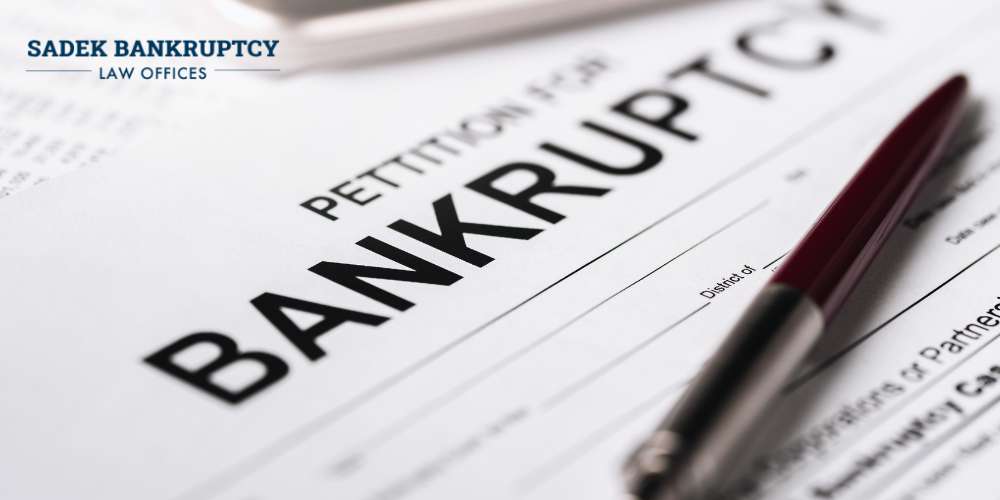Bankruptcy Laws in Pennsylvania and New Jersey
Top Bankruptcy Attorneys and Home Foreclosure Defense Attorneys.
Over 750 ★★★★★ Google Reviews

Contact Our Attorneys Today



EVALUATION
At Sadek Bankruptcy Law Offices, we realize that every situation is different. Our debt relief lawyers will take the time to learn about your situation and your goals. Our objective is to explain your legal options and offer the best debt relief strategy for you in the most compassionate and friendly manner possible. Call 24/7 to schedule your meeting with a lawyer.
AVAILABLE
Our office understands the financial stress our clients endure. Therefore, in addition to reasonable legal fees, we offer a payment plan to all of our valued clients to make quality legal services most affordable.
AND NJ
In addition to our primary law office in Center City, Philadelphia, we also have law offices throughout the Greater Philadelphia, Pennsylvania Area and in New Jersey. Our branch offices have contributed to making us the #1 Bankruptcy Filer and debt relief firm in the Greater Philadelphia area. Our goal is to have a convenient location within 20 minutes of where our clients work or reside.
Understanding Bankruptcy Laws in NJ and PA
Bankruptcy is an important tool for people struggling with financial challenges. Nevertheless, the complicated nature of bankruptcy laws and regulations can scare off those who could benefit from bankruptcy the most. If you have put off seeking bankruptcy protection due to confusing bankruptcy laws, call the Sadek Bankruptcy Law Offices today. Our legal team can help clear up confusion about laws on bankruptcy and help you file for bankruptcy in PA and NJ.
The legal team at Sadek Law handles both Chapter 7 and Chapter 13 bankruptcy cases. Whether you need to file personal bankruptcy or small business bankruptcy, our New Jersey and Pennsylvania bankruptcy lawyers can help. We work diligently on your behalf to settle bankruptcy issues and, when possible, release you from the legal obligation to pay debts.
Schedule a free initial consultation to learn more about Chapter 13 and Chapter 7 bankruptcy in PA and NJ. Call (215) 545-0008 to reach our Pennsylvania office or (856) 890-9003 to reach our New Jersey location.
Federal Bankruptcy Code and Bankruptcy Laws
When you’re struggling to make debt payments, the last thing you need is additional stress. The Sadek Law legal team strives to make the process of filing for bankruptcy as easy as possible. Our lawyers use their understanding of PA bankruptcy laws, NJ bankruptcy laws, and federal regulations to help clients prepare for bankruptcy.
For the most part, federal laws play the most significant role in governing bankruptcy matters in the U.S. Specifically, the United States Code lays the groundwork for how bankruptcy works.
Title 11 of the United States Code - The Bankruptcy Code
Title 11 of the United States Code outlines bankruptcy law, including rules and regulations related to qualifying for bankruptcy, bankruptcy case administration, creditor rights, and debtor rights. Also referred to as the Bankruptcy Code, Title 11 details the duties of trustees in administering cases and preventing bankruptcy fraud. The Bankruptcy Code also explains the different types of bankruptcy.
Chapter 7 bankruptcy wipes out debts from unsecured creditors, such as credit card debt, medical bills, and unsecured personal loans. Also known as straight bankruptcy, Chapter 7 involves liquidating the debtor’s property and using the proceeds to pay creditors.
Chapter 11 bankruptcy is primarily a type of business bankruptcy. Business owners must agree to a repayment plan approved by their creditors and the bankruptcy court. If the plan is approved, the debtor can continue to operate their business.
Chapter 13 bankruptcy restructures debts to make debt repayment easier. This allows debtors to keep all their assets while paying bills and debts over a period of 3 to 5 years. Chapter 13 bankruptcy can be particularly useful for debtors who need help repaying secured debts, such as car loans or mortgaged property.
Chapter 12 bankruptcy works similarly to Chapter 13, but applies exclusively to family farmers and family fishermen.
Title 28 of the United States Code - Judiciary and Judicial Procedure
Title 28 of the United States Code governs the federal judicial system. Chapter 6 under Title 28 of the code gives bankruptcy judges the authority over bankruptcy actions, suits, and proceedings. This chapter also details how bankruptcy judges are appointed, the number of judges that serve in each state, the judges’ duties, the character of judges’ service, and much more.
The Bankruptcy Abuse Prevention and Consumer Protection Act of 2005
The Bankruptcy Abuse Prevention and Consumer Protection Act of 2005 is a recent update to the federal laws on bankruptcy. This act updated certain qualification criteria and added course requirements for people filing Chapter 7 or Chapter 13 bankruptcy.
Before filing for Chapter 7 bankruptcy, debtors must take a bankruptcy means test. This test determines if you have enough disposable income to pay debts. If your income level disqualifies you from Chapter 7 bankruptcy, you can file Chapter 13 bankruptcy instead.
Under both Chapter 7 and Chapter 13 bankruptcy, debtors must complete course requirements before and after filing for bankruptcy. The credit counseling course, required before filing, aims to help people understand their current financial situation. The course also offers information on alternatives to filing bankruptcy. After filing for bankruptcy, you will need to complete a debtor education course. This course educates debtors on how to manage their financial affairs and avoid future debt issues.

State Bankruptcy Laws
Broadly speaking, bankruptcy matters are governed by federal law rather than state law. Specifically, the U.S. Bankruptcy Code details regulations, processes, and rights related to bankruptcy. However, state laws can affect bankruptcy proceedings specifically for Chapter 7.
Bankruptcy courts require debtors filing bankruptcy under Chapter 7 to liquidate certain assets to repay their debts. This does not mean you will lose all of your valuable property to the liquidation process. Under federal law, certain property is exempt from Chapter 7 liquidation. Below we’ve included some of the federal exemptions that apply to bankruptcy cases filed between April 1, 2025 and April 1, 2028:
- Homestead Exemption. This exemption protects $31,575 of equity in a principal residence for individuals or $63,150 for married couples.
- Personal Property Exemptions. Certain value amounts are protected for various types of property. For example, federal exemptions protect $5,025 of value for your motor vehicle. You can also exclude $800 per item for a total of $16,850 in household goods, including furniture, clothing, appliances, animals, and more.
- Loans, Dividends, and Interest. Federal exemptions allow debtors to exclude $16,850 in loan value, accrued dividends, and life insurance policy interest.
- Wildcard Exemption. Wild card exemptions apply to any property you choose. Debtors can use $1,675 plus up to $15,800 of an unused portion of the homestead exemption.
Some states only include federally exempt assets in Chapter 7 bankruptcy proceedings. Certain states, however, allow residents to choose between federal exemptions and state exemptions. Filers must choose one or the other. They may not choose items from both lists. Both Pennsylvania and New Jersey have state exemption options.
Bankruptcy Laws PA
Pennsylvania state exemptions for Chapter 7 bankruptcy include protection for up to 75% of your wages. Certain types of personal property, such as clothes, religious texts, and school books, cannot be used to repay debts under Chapter 7.
State law also excludes certain benefits, including workers’ compensation, unemployment compensation, and veterans’ benefits, from bankruptcy liquidation. Insurance exemptions apply to accident and disability benefits, annuity proceeds, fraternal/society benefits, no-fault automobile proceeds, and life/group life insurance benefits. Private retirement benefits and public pensions for certain types of employees are also exempt property.
How do you decide which exemptions to apply to your bankruptcy case? The best choice depends on the details of your unique situation. The Pennsylvania Chapter 7 bankruptcy lawyers at Sadek Law can help you consider your options and offer professional guidance regarding property exemptions.
NJ Bankruptcy Laws
New Jersey state law excludes certain personal property from Chapter 7 liquidation, including clothing, burial plots, and stocks/interests in corporations. You can also count up to $1,000 worth of furniture or household goods as exempt property. This amount can be applied to vehicles.
The law protects retirement accounts for public employees and certain private employees. Exempt public and charitable benefits include public assistance, workers’ compensation, unemployment compensation, and crime victims’ compensation. Various insurance exclusions also apply, including health and disability benefits, life insurance benefits, and more.
New Jersey laws also exclude 90% of unpaid wages for individuals whose income falls under 250% of the federal poverty level. For wages higher than this limit, 75% of the unpaid wages are protected.
Don’t rush picking between federal and state exemptions for Chapter 7 bankruptcy. Our New Jersey bankruptcy attorneys will carefully review your case to help you determine which exemptions will allow you to protect the property you want to keep.
Is Bankruptcy Court Federal or State?
Bankruptcy matters fall under federal law. Therefore, all bankruptcy cases go through federal courts.

How the Laws on Bankruptcy Protect Creditors
Bankruptcy laws afford creditors certain protections and rights during the bankruptcy process. Generally, the bankruptcy trustee assigned to your case will ensure creditors receive their fair share of payments from your bankruptcy case.
Bankruptcy law typically prioritizes payments to certain priority claims and secured creditors’ claims. Creditors also have the right to attend the meeting of creditors and ask questions regarding your bankruptcy case. The court will hear creditors’ claims during Chapter 7 distribution and Chapter 13 debt restructuring.
Creditors may initiate adversary proceedings against their debtors. Under certain conditions, they can contest the discharge of debts or ask the judge to lift an automatic stay. They can pursue legal enforcement of foreclosures and repossessions. Additionally, creditors may dispute a fraudulent transfer or property.
How a New Jersey or Pennsylvania Bankruptcy Attorney Can Help
Filing for bankruptcy involves meeting strict legal requirements and submitting detailed paperwork. While you could attempt to file on your own, you risk making costly mistakes that could seriously delay your access to debt relief. When you work with a bankruptcy attorney, you gain access to a wealth of specialized knowledge and experience.
Save yourself time and unnecessary stress by seeking professional legal assistance from the Sadek Bankruptcy Law Offices. Our bankruptcy lawyers help clients make informed decisions about bankruptcy. With that goal in mind, we explain the different types of bankruptcy, help you explore New Jersey and Philadelphia bankruptcy alternatives, and inform you about how bankruptcy affects various aspects of your life.
Inform You of Your Legal Rights
While bankruptcy courts prioritize fairness during any bankruptcy case, you stand a better chance of achieving the most favorable outcome possible when you know your rights. Additionally, knowing your rights can help you decide if bankruptcy is right for you. The bankruptcy lawyers at Sadek Law will keep you informed of your legal rights and protect those rights throughout your case.
Before filing for bankruptcy, it is important to understand which debts cannot be discharged by filing for bankruptcy in Pennsylvania and New Jersey. Bankruptcy cannot clear all your debts. For example, bankruptcy typically does not discharge money owed for child support or alimony, criminal fines, or most taxes. It cannot eliminate debts incurred through fraud. Bankruptcy does not usually discharge student loans owed to schools or government bodies.
Our team can also help you understand your rights once you have filed for bankruptcy. Once you file bankruptcy, the court mails your creditors a notice of an automatic stay. The automatic stay prevents creditors from continuing to collect payments or contacting you. It can stop wage garnishments, foreclosures, repossessions, and more. We’ll also educate you about exempt and nonexempt property for Chapter 7 bankruptcy and help you choose exemption options that will protect your most valued property.
Guide You Through the Bankruptcy Process
Our team provides steadfast support throughout the entire bankruptcy process. We’ll help you consider which type of bankruptcy you should file and ensure that you meet bankruptcy qualifications. This can involve helping you fill out paperwork for the Chapter 7 means test, setting you up to take an approved credit counseling course, and generally gathering information for the bankruptcy petition.
After filing, your case goes through multiple stages before debts are discharged. Our team will prepare you for every step. We will inform you about the roles of officials involved in the bankruptcy process, including judges, United States Trustees, and case trustees. We’ll help you understand what to expect at a 341 hearing. Your lawyer will also represent you during bankruptcy legal proceedings.
Aid You in Filing Bankruptcy
To file a bankruptcy petition, you must fill out multiple detailed forms, provide certain personal and financial records, and pay the filing fee. You also need to file your petition within a certain amount of time after completing the credit counseling course. Any mistakes on your bankruptcy petition can lead to the Bankruptcy Court rejecting your case. Although a rejection does not disqualify you from reapplying, you may be forced to wait to file again.
We at Sadek Bankruptcy Law Offices make bankruptcy filing easy. We ensure that there are no issues with your bankruptcy petition. We’ll handle the paperwork for you and help you determine which records to include. Once the paperwork is done and you’ve brought in your records, our lawyers make sure the petition is filed correctly.

Need Help Understanding the Laws on Bankruptcy? Call PA & NJ Bankruptcy Lawyers at Sadek Law Today
You do not have to overcome your financial difficulties on your own. Lead Attorney Brad J. Sadek and the legal team at Sadek Law understand the stress that our clients face when creditors relentlessly pursue debt payment. That’s why our lawyers provide compassionate guidance regarding bankruptcy and alternative options for debt relief. Allow us to help you achieve peace of mind and take control of your life once more.
Whether you need legal counsel yourself or you know someone who is struggling to pay his or her bills, do not hesitate to contact the Sadek Bankruptcy Law Offices. Our Chapter 7 and Chapter 13 Bankruptcy Pennsylvania attorneys and New Jersey attorneys are ready to help. You can schedule a free consultation by calling our Pennsylvania office at (215) 545-0008. New Jersey clients can reach us by calling (856) 890-9003. Clients may contact us online.
